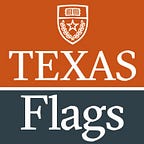Diversifying LGBTQ Studies
The study of any subject in the academic world has traditionally lacked the inclusion of lesbian, gay, bisexual, trans and queer (LGBTQ) peoples’ history and impact. “Introduction to LGBTQ Studies,” which carries both a Cultural Diversity and Writing Flag, aims to provide students at the University of Texas at Austin the space and tools to explore concepts of gender and sexuality, race, class, religion, and nation on theoretical and historical levels.
Students, according to the course’s syllabus, are equipped with the materials needed to answer questions like: What is the meaning of the acronym “LGBTQ,” and how did we arrive at this collection of letters? How does the history of the LGBTQ+ movement inform academic study? What role does theory play in the study of LGBTQ+ lives and experiences?
Ashley Coleman Taylor, an Assistant Professor in the College of Liberal Arts’ Department of Religious Studies and the Center for Women’s and Gender Studies, uses a Black feminist framework to help students see the full scope and impact of topics and varying experiences of citizenships, immigration, scientific racism and ability within discussion of LGBTQ Studies.
“I use a critique of hegemonic power and heteronormativity to uncover the ways that privilege and access work in our society,” Coleman Taylor said. “Intersectionality is not just about listing your identities, but really doing this critical work of understanding how power and the ability to access resources has got to be a part of the conversation.”
In order to foster these discussions, Coleman Taylor said she structures the course around historical moments like the homophile movement, pre-colonial gender and Stonewall, because most students are not exposed to LGBTQ history in the education system. She added that it is also important to broaden the cannon of academia, or narratives and texts considered to be most important and influential to a field.
“What I seek to do in this class is not just teach students about gender studies scholars like Judith Butler, but also, I want them to learn about C. Riley Snorton and his work with Black Trans Studies,” Coleman Taylor said. “I want them to learn about what Audre Lorde has to say about gender, and I want them to also learn about Evelyn Blackwood’s work on pre-colonial gender.”
One avenue to further these discussions are the critical response papers students are required to complete throughout the semester. These papers and the final exam satisfy the Writing Flag. According to the Writing Flag webpage, assignments like this help students improve their critical thinking skills, understanding of course content, ability to formulate ideas in writing, and ability to write in the style of a particular discipline.
Coleman Taylor said in the humanities a good deal of thinking is done through writing, making the writing skills students in the class practice vital.
“In the humanities, we write in order to understand our own thoughts and in order to process these kinds of very difficult concepts,” she said.
In addition to carrying a Writing Flag, the course also carries a Cultural Diversity Flag. The purpose of this flag, according to the Flag webpage, is for students to explore in depth the shared practices and beliefs of one or more underrepresented cultural groups subject to persistent marginalization and reflect on their own cultural experiences.
A student who took the course in a previous semester wrote in their end-of semester survey that the Cultural Diversity Flag is important to maintaining not only diversity, but equality at UT.
“By requiring that students learn about another culture separate from their own identity in the U.S., the University of Texas at Austin is ensuring that its students have an understanding of the world and its people, and the importance of culture on expanding on and connecting the human experience,” the student wrote.
Coleman Taylor added that students who are part of the LGBTQ community or other marginalized communities are taught to minimize or silence themselves within a hegemonic academic world. For this reason, she said she sees a lot of students seek out courses like this to make sense of their own personal histories.
Another student who took the course in a previous semester could attest to this. They wrote in their end-of-semester survey that the class was great for perspective and insight of the LGBTQ community, and it was important for queer students like themselves to have access to a course like this to explore the diversity of the queer community.
“I think it is important for students to know they are experts in their own lived experience,” Coleman Taylor said. “Different voices are important. We must listen to the voices of the most marginalized. We all should be able to have access to power that only one group has traditionally held.”
She said the different voices that compose the diverse student population at UT benefit from the Cultural Diversity Flag because it is important for students to be able to see themselves and their friends reflected in the courses they take. She said she hopes students leave the class knowing they aren’t the first to walk the path of disrupting the racist and homophobic norms of what a citizen of this country should look like, and they won’t be the last.
“I hope they remember that we’ve been here before, that we’ve been walking on this very land, we have had these experiences,” Coleman Taylor said. “I hope they remember that disrupting norms is vital to our survival. It’s vital to queer and trans people of color’s survival. It’s vital to the larger LGBTQ community.”
